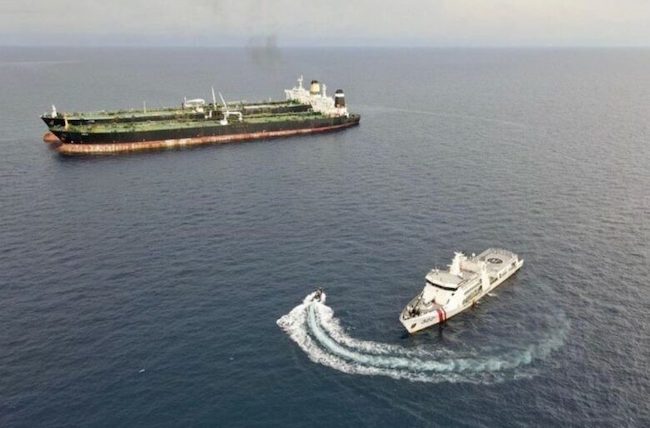

Unlawful Detentions off Indonesia?

The detention of vessels in and around the Singapore Straits by the Indonesian Navy in recent months (following an earlier cluster of cases in 2019) has presented challenges to the shipowners involved. It raises difficult issues in respect to what constitutes “innocent passage” and the tensions between that fundamental right under the law of the sea and the law of coastal states. It further puts in focus the political tensions in the region and the negotiated (and yet-to-be negotiated) boundaries between Singapore, Indonesia and Malaysia – all of whom have their own historic reference points and geo-strategic priorities. Further, in the face of demands of payment of sums around US$300,000 by the Navy against a threat of prolonged detention of the vessel and imprisonment of the masters involved, a serious question arises as to the status of the funds paid in the face of such a threat. Should a payment (which feels more like a ransom paid to pirates) extorted under duress be a ‘bribe’ as understood in the context of anti-bribery legislation?
Indonesian law provides that permits are required to anchor in Indonesian waters. The legislation provides for an administrative fine in the region of around US$14,000 for anchoring in the absence of such a permit.[1] The Indonesian Navy has seen fit to enforce this law against all ships that stop in Indonesian waters and that has involved armed personnel boarding the ships and the master being given little choice but to proceed to the anchorage near the naval base off Batam Island. The seas in and around Singapore are some of the busiest in the world. Delays exacerbated by COVID have seen vessels in the area for weeks at a time. Indonesia, whilst perhaps frustrated at the number of vessels that are anchoring in territorial waters, has arguably sought to exploit the situation.
The masters are taken ashore and kept in the naval base in small rooms with no bedding, air conditioning or mosquito nets. Whilst not imprisoned, they are certainly not free to leave. All the ships’ papers are also taken as are the crews’ Seaman’s Books and passports. The detention is not supported by any formal court order. Indeed, the threat made by the Indonesian Navy is that the owners are welcome to challenge the detention in court but that will take many months. Habeas Corpus is turned on its head. The potential losses to a vessel, particularly if laden or on charter, are considerable. As it is made clear to the shipowners, the alternative is to pay money through an intermediary who then secures the necessary release papers from the Navy.
This article seeks to answer the serious questions that these cases give rise to. As has been indicated above these are on two levels. The first assumes that Indonesia’s explanation for these arrests – that they are part of a legitimate anti-smuggling operation – is accurate – in which case the question that arises is whether they are consistent with the right of innocent passage through the territorial sea enshrined in Article 17 of the United Nations Convention on the Law of the Sea (UNCLOS), to which Indonesia and all major flag states are states parties. The second is the status of those payments.
Coastal state rights and innocent passage
There is good reason why territorial waters are not marked on the day-to-day navigational charts. They are generally of no import to a master going about the lawful business of engaging in trade in the maritime domain. Where those boundaries lie is of little concern unless undertaking ship-to-ship operations for example. In the archipelagic waters around Indonesia the situation is even more nuanced. UNCLOS Article 17 provides in terms that “subject to this Convention, ships of all States, whether coastal or land-locked, enjoy the right of innocent passage through the territorial sea”. Passage, in turn, is defined in UNCLOS Article 18:
(1) Passage means navigation through the territorial sea for the purpose of:
(a) traversing that sea without entering internal waters or calling at a roadstead or port facility outside internal waters;
(b) proceeding to or from internal waters or a call at such roadstead or port facility.
(2) Passage shall be continuous and expeditious. However, passage includes stopping and anchoring, but only insofar as the same are incidental to the navigation or are rendered necessary by force majeure or distress or for the purpose of rendering assistance to persons, ships or aircraft in danger or distress.
The first question that arises, therefore, is whether commercial shipping anchored at Singapore OTP (or in the surrounding area) is engaged in passage. So far as these vessels are concerned, they fall within the ambit of Article 18(1)(a) as they are traversing the territorial waters around Bintam and Batam Islands without calling or proposing to call at an Indonesian port.
Difficulties arise, however, from the requirement in Article 18(2) that passage must be “continuous and expeditious” to be considered as such. This requirement, however, is diluted the caveat in the following sentence that passage “includes stopping and anchoring, but only insofar as the same are incidental to […] navigation”. But what exactly is “incidental” to navigation? No answer to this question has ever been provided by an international court or tribunal. But it seems strongly arguable that temporary anchorage in the territorial waters of state A whilst waiting for a berth at a port of state B is sufficiently incidental to qualify – at least where the entry into the territorial waters of state A constitutes a minor detour from the vessel’s existing course. As the leading commentary on the provision states:
The view that a vessel anchoring in the territorial sea of another state has broken passage and may be regarded as within these waters for purposes other than innocent passage is no longer tenable. […] In practice it is difficult to ascertain whether or not stoppage or anchoring is incidental to ordinary navigation. Typically, this would include anchoring in bad weather, stoppage due to mechanical failure, temporary anchorage outside a port whilst awaiting a berth, anchorage pending pilotage and other navigational assistance, and anchorage under direction from the coastal State. Coastal States may be more ready to interfere with foreign vessels when there is some manifestation of non-innocence rather than on the basis of the quality of passage alone.[2]
The commentary does not answer clearly the question of whether the port in question must be of the state whose territorial sea is being traversed by the vessel (e.g. an Indonesian port) – or whether it is acceptable for the port to be in a different state (e.g. Singapore). Nor does it specify the amount of time that the vessel can spend anchored before the vessel is no longer engaged in passage and deemed to be hovering – and thus subject to arrest by the coastal state. It may well be that intention is key, in that an actively trading vessel is only ever going to be anchored temporarily. In other words, absent, say, a desire to lay up the vessel, then a littoral state should not interfere with a vessel at anchor.
The next matter is whether the passage is innocent – in the sense of UNCLOS Article 19. Article 19(1) says that passage is innocent “so long as it is not prejudicial to the peace, good order or security of the coastal State”. There is a presumption of innocence within this provision. As Article 19(2)(g) makes clear, the passage of a ship engaged in smuggling activity is not innocent. However, the burden is on the coastal state to establish that the vessel in question is engaged in that activity. Unless or until smuggling is proved, action cannot be taken. Per Article 25(1), a coastal state only has the right to take steps against vessels engaged in passage through its territorial sea where passage has ceased to be innocent. And per Article 24(1), the coastal state “shall not hamper the innocent passage of foreign ships through the territorial sea except in accordance with this Convention”.
For any commercial vessel off Bintam and Batam Islands, therefore, the question is this: presuming it is not engaged in smuggling (such that its passage is not innocent), how long can it anchor at Singapore OPL before it is susceptible to arrest by the Indonesian Navy (on the basis that it is no longer engaged in passage)? That may be a context-sensitive question: the waters around these islands are well-known anchoring points for commercial vessels, which may be entitled to more leeway than in other locations particularly where covid requires quarantining of a vessel. But what is clear is that the official Indonesian position – that any vessel anchored in its territorial waters without permission can be fined and/or detained – is unsustainable. Depending on the circumstances of individual vessels, its policy could well be in breach of UNCLOS Article 17, and give rise to liability in public international law as a consequence.
Bribery versus Extortion
The bottom line is that an owner in this situation does not have the luxury of time to resolve the matter through an international forum like the International Tribunal for the Law of the Sea or indeed through the local Courts. The vessels are detained and the masters are removed by armed military personnel. The master is threatened with losing his freedom for up to five years. Exposure to “ordinary judicial process” is made out to be a threat that can be avoided if money is paid to those in the naval command that have control of the vessel. In fact the reasonable expectation is that an administrative process properly followed should take only a matter of days not the months that the navy can make it last. Where the Indonesian Navy are detaining vessels with the aim of extorting money, then those detentions cannot be lawful. It is an abuse of state power and arguably falls within the definition of “restraint of princes” with all the implications that brings under insurance policies and charterparties/contracts of carriage.
Faced with potentially catastrophic and potentially uninsured losses Owners are then faced with paying the Navy to seek the timely release of the vessel. This raises the vexed issue of whether such a payment is a bribe. In one leading case it was held that an owner with a vessel in a protracted detention could not be expected to pay a bribe to avoid for example, a claim for a deemed Constructive Total Loss.[3] In the context of war risk cases where an insurer seeks to avoid a detention claim because a seizure for customs or trading regulations the English Courts have long recognised that a claim may be payable where that detention is unlawful and is political in nature. The reality in these detention cases is that it is the Indonesian Navy who is ‘offering’ the owners the choice to pay to avoid a protracted period of detention before the Courts are formally involved. This is causing real and understandable concern within compliance teams at the owners’ offices and those of their insurers. The main difference between bribery and extortion is one of intent. A bribe usually bestows a benefit on the person paying and those on both sides of the deal are guilty. In the case of extortion, the person paying is treated as the victim. Article 15 of the United Nations Convention against Corruption defines bribery as the promise, offering or giving of an “undue advantage”. The Bribery Act refers to the procuring or rewarding the improper performance of a “relevant function” by any person. It is arguable, therefore, that a payment made to someone extorting money for the release particularly of a master facing physical harm who is placed into detention other than by way of an ordinary judicial process, is not a bribe. [4]
The Bribery Act, 2010 guidelines make clear that even if such a payment could be said to be a bribe then there is “very likely” a defence for duress where there is a threat to life, limb or liberty. In the cases off Indonesia, there is a direct threat to the master’s liberty and it seems that the defence should apply. It hardly seems in the interest of any government to prosecute in those circumstances. That defence does not usually arise in the case of economic duress which is what the owner is facing if a ship is detained for any length of time. However, the Supreme Court of the United Kingdom has recently had to consider this in the context of a civil case[5] where it made clear that in exceptional circumstances involving an illegitimate threat where the threatened party has no real alternative (perhaps faced with bankruptcy) then economic duress is a defence. There is no suggestion that this would apply in a criminal case but it is interesting that the Supreme Court has opened the door to this being given further consideration. It is a debate worth pursuing.
This article does not touch on where liabilities should fall both in terms of the owners and their insurers (although there would, for example, be an interesting discussion to be had as to whether this constituted illegal possession of an insured’s ship) and as between owners and charterers or cargo interests. However, as we have seen off Saudi Arabia, forcible interdictions of or interference with commercial shipping contrary to international law often go unchallenged in the maritime industry. The merchant fleets crews have had enough to cope with in the past eighteen months without the stress of dealing with the capricious actions of some coastal states. Owners have had enough to deal with without facing prosecution for payments made under extreme duress.
This article was produced jointly with Cameron Miles: https://www.3vb.com/our-people/jc/cameron-miles
[1] In a response to Reuters the Navy has suggested that some masters have been fined between US$1,300 and US$7,000: https://www.reuters.com/world/asia-pacific/shipowners-make-payoffs-free-vessels-held-by-indonesian-navy-near-singapore-2021-11-14/
[2] RA Barnes, ‘Article 18 – Meaning of Passage’ in A Proelss (ed), The United Nations Convention on the Law of the Sea: A Commentary (CH Beck/Hart/Nomos 2017) 181, ¶¶ 8–9 (emphasis added).
[3] See e.g. The Anita [1970] 2 Lloyds Rep 365.
[4] Under the US Foreign Corrupt Practices Act it is said a similar defence arises for “true extortion” but again this is said not to apply to potential economic harm.
[5] Pakistan International Airline Corporation v Times Travel (UK) Ltd [2021] UKSC 40.

